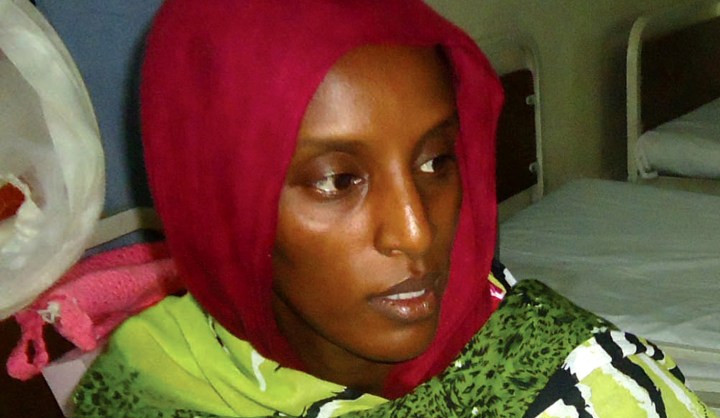Africa
Meriam Ibrahim: Another victim of Sudan’s disregard for its citizens

Freedom didn’t last long for Meriam Ibrahim and her two young children, both of whom have spent most of their lives in a Sudanese prison. After her unexpected release on Monday, she was rearrested on Tuesday and taken to an undisclosed location. Her crime was to be a Christian in a Muslim country, and to marry a Christian man. Her treatment by her own government is a symbol of all that’s wrong with Sudan. By SIMON ALLISON.
For a few hours on Monday afternoon, there was some good news emanating from Sudan. This is, in international media, something of a rarity – the country is better known for Darfur, authoritarianism and President Omar al-Bashir’s continued avoidance of the International Criminal Court, where he is wanted on charges of crimes against humanity and war crimes.
But even this bit of good news stemmed from a bad situation, and didn’t last for long.
At the centre of the storm is Meriam Ibrahim, a 27-year-old wife and a mother who made one crucial mistake: She married a Christian man in an intensely Muslim country. But why shouldn’t she have? Ibrahim’s absentee father may have been Muslim, but her mother was Christian orthodox and she was raised in that faith. This, however, is highly criminal behaviour in Sudan, and Ibrahim was reported to the authorities, who wasted no time in arresting her. She was detained in February along with her one-year-old son, and was eight months pregnant at the time. That baby, a girl, was born in prison a month later.
Ibrahim was charged with adultery, because a marriage between a Muslim and a Christian cannot possibly be valid. And Ibrahim, regardless of her own convictions, is deemed to be a Muslim in the eyes of the law because, legally, religion is patriarchal – you are what your father is. She was eventually convicted last month as an adulterer and an apostate, and sentenced to 100 lashes and death by hanging.
Now for the good news. On Monday afternoon, a higher court – one with a semblance of common sense – reversed the decision, mindful too of the outcry from both Sudanese and international civil society. Meriam Ibrahim and her children were immediately released from prison. “We are very, very happy about this – and we’re going to her now,” said Ibrahim’s lawyer, Elshareef Ali. “She’s on her way to home…It’s a victory for freedom of religion in Sudan…By Mariam’s strong position, we believe that in the future no-one will be subjected to such a trial,” he said.
Ali spoke to soon. This is Sudan, a country where good news stories don’t last long.
On Tuesday, Ibrahim, her husband and her children tried to leave the country through Khartoum airport. Waiting for them, according to media reports, were around 40 operatives from the National Intelligence and Security Service, Sudan’s shadowy but influential intelligence organisation. The family was detained again.
“The (NISS) is an extremely powerful body, which frequently intervenes in Sudanese politics. It is a key part of the informal coalition – also comprising the military, Islamists and pragmatists – which rules Sudan,” explained James Copnall, former BBC Sudan correspondent. “The different components are constantly jockeying for a better position. In recent times, NISS has been flexing its muscles. It is very possible that NISS did not like the decision to release Meriam Ibrahim, and re-arresting her and her family was a way of making this point to the rest of the Sudanese government.”
Ibrahim and her family, in other words, are just pawns in Sudan’s own domestic power games. Their eventual fate is impossible to predict.
In many ways, Ibrahim’s case is a symbol of so much of what is wrong with Sudan.
There is the element of religious intolerance, which is such a powerful force in the country. Persecution of minority religions, especially Christianity, is commonplace. That was, ultimately, one of the major reasons why South Sudanese fought so hard against the regime in Khartoum, and opted overwhelmingly to secede when they had a chance.
There is, too, the element of gender discrimination, embodied in that legal ruling that Ibrahim’s father’s religion must necessarily be hers. Gender inequality is endemic in Sudan: in the UN’s Gender Inequality Index, Sudan ranks 171 out of 186 assessed countries. Education is a particular problem. Of 2.1 million school-age children, only 20% go to school at all, and girls make up only 25% of this figure.
Most of all, however, the case symbolises just how powerless Sudan’s citizens are to protect themselves against a government that puts power before people, and its internal faction-fighting against any semblance of justice and the rule of law. Sudan’s constitution, for what it’s worth, actually guarantees freedom of religion – not a right afforded to Meriam Ibrahim. Countless other Sudanese citizens – from the killings in Darfur to the ongoing indiscriminate aerial bombardment in South Kordofan – have been sacrificed to the same disregard from the institutions theoretically supposed to protect them. DM
Photo: A file photo dated 29 May 2014 shows Sudanese woman Meriam Ibrahim, who was on death row for marrying a Christian and refusing to convert back to Islam, at Omdurman women’s prison near Khartoum, Sudan. An appeals court in central Sudan ordered the release of Meriam Ibrahim on death row for marrying a Christian and refusing to convert back to Islam, a local news agency reported 23 June 2014. She had been sentenced to death by hanging on 15 May when she refused to recant her Christian faith after a Khartoum court found her guilty of apostasy and adultery on 11 May. EPA/STR



















 Become an Insider
Become an Insider